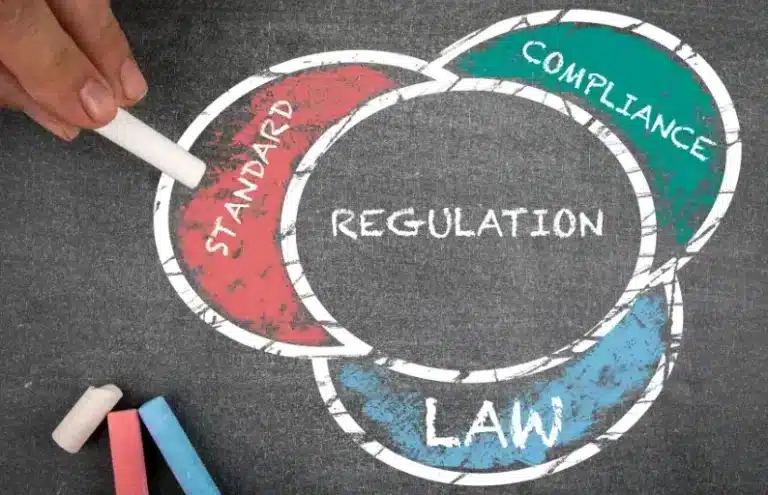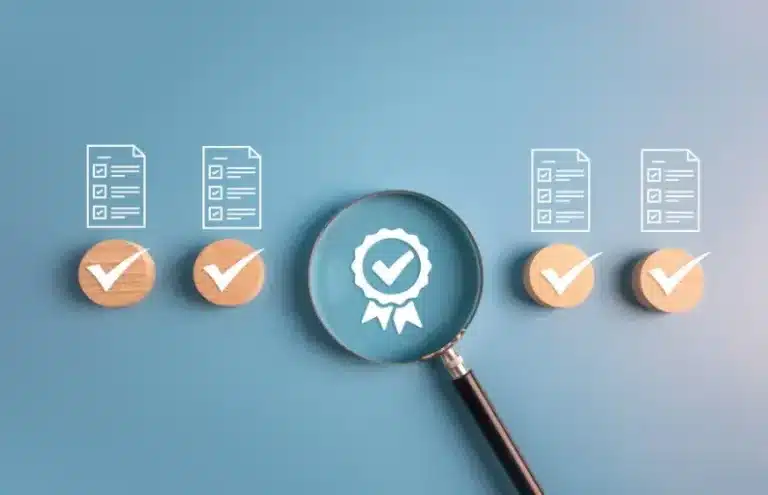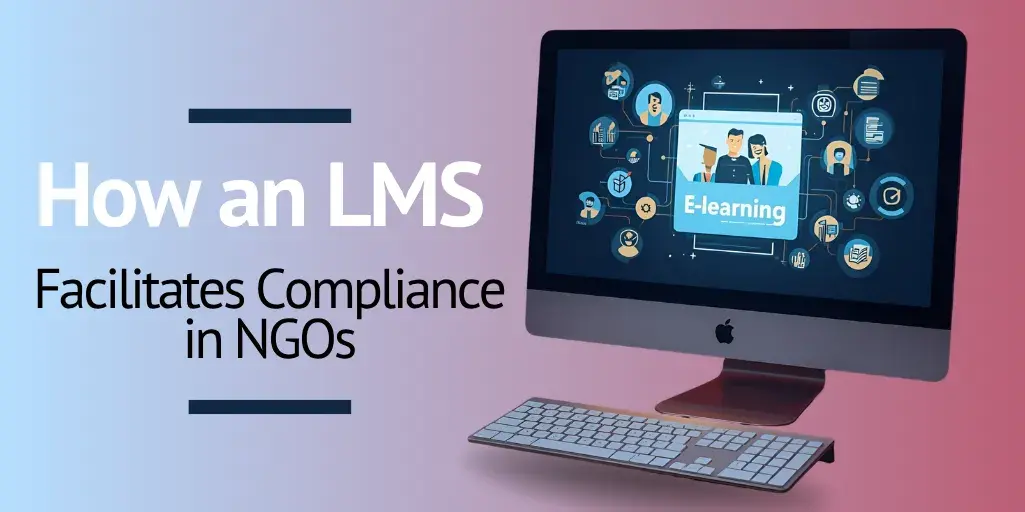Running a non-profit organisation today means much more than delivering humanitarian or social projects. The trust placed in these entities by the public and funders depends on their ability to act with transparency, ethics, and strict adherence to regulations. But what happens when an NGO fails to demonstrate compliance with current regulations?
The risk goes beyond financial penalties — it threatens the very credibility and legitimacy that underpin their mission.
In a context where international cooperation, EU funding, and national grants increasingly demand clear evidence of compliance in NGOs, training becomes a strategic pillar.
However, the teams within these organisations are often diverse: salaried staff, temporary volunteers, and external collaborators spread across different countries… How can we ensure that everyone receives adequate preparation on legal, ethical, and operational matters?
Digital training for social organisations, using tools designed to manage learning in a centralised and traceable way, offers one solution. An elearning platform for NGOs and foundations allows non-profit organisations to transform how they deliver compliance training for NGOs, ensuring programmes are consistent, accessible, and auditable from anywhere in the world.
Thus, elearning for legal compliance becomes the most efficient route to strengthen public trust, reduce reputational risks for NGOs, and demonstrate a genuine commitment to transparency for funders and auditors alike.
Why is compliance increasingly important for NGOs?

The role of non-profit organisations has never been more visible or more crucial than it is today. We live in an interconnected world, vulnerable to humanitarian, environmental, and social crises, where NGOs have become essential actors in channelling resources, supporting communities, and providing solutions where governments fall short.
Precisely because of this relevance, the demand for transparency and accountability has grown stronger. Society is no longer satisfied with declarations of good intentions: it expects clear evidence that an organisation operates ethically and within the legal framework.
This context requires organisations to embed compliance in NGOs as a structural part of their management. Compliance is not just an administrative formality — it is a guarantee that funds are used properly, data protection is ensured, and that beneficiaries, staff, and volunteers are safeguarded against abuse or misconduct.
How can NGOs uphold their mission if they are unable to demonstrate to auditors, donors, and the public that they operate within the law and meet international ethical standards?
More Audits and Greater Ethical Demands
The year 2025 marks a turning point. European data protection regulations, anti-money laundering laws, and the transparency requirements of international bodies such as the UN and the European Commission are being enforced with increasing rigour.
Every grant requires detailed reporting, every project must demonstrate a robust system of auditing and training in NGOs, and private donors demand verifiable evidence.
Moreover, we live in an era of constant scrutiny. Social media amplifies any mistake, and the press closely investigates the use of public or international funds.
This reality creates an environment where ethics is no longer seen as an added value but as an essential requirement for operation. Compliance in NGOs has therefore become a mark of legitimacy in the eyes of funders and civil society.
Common Risks: Lack of Training, Unawareness and Human Error
When an organisation lacks a structured training plan, the risks go far beyond theory.
A volunteer handling personal data without understanding the implications of the General Data Protection Regulation, a local worker unaware of financial restrictions imposed on certain countries, or a manager who fails to update internal protocols in time — all represent real vulnerabilities.
These gaps can lead to sanctions, loss of funding, and even serious reputational risks for the NGO.
In many cases, the issue is not ill intent but lack of knowledge. The frequent staff turnover and cultural diversity that define the third sector make a model of mandatory training in NGOs essential — one that is consistent, accessible, and adaptable to different roles.
A single human error can trigger a chain of legal and ethical consequences that impact the entire organisation. This is why ethics training for NGOs must be a recurring, traceable element — not a one-off or improvised action.
Consequences of Non-Compliance for an NGO

Every time an organisation fails to comply with a regulation — whether due to lack of knowledge or inadequate preparation — it not only faces legal penalties. The real impact lies in the trust placed in it by society and donors.
Who would want to fund humanitarian projects without the assurance that resources are being managed with rigour? What community would accept help from an organisation that does not properly protect the data of its beneficiaries?
Non-compliance in the third sector results in very real consequences, both legal and financial.
- 1) Loss of funding: The most obvious is the loss of access to public or international funds. Institutions that finance social projects set strict compliance requirements for NGOs, and failing to meet them can exclude an organisation from key calls for proposals.
- 2) Added to this are administrative or financial penalties resulting from regulations such as data protection laws or labour legislation — meaning money that should go directly to projects ends up being used to pay fines.
- 3) Another consequence — perhaps the most devastating in the long term — is reputational damage. Public perception is an intangible yet vital asset: one high-profile case of malpractice is enough to sow doubt. Reputational risks for NGOs have a multiplying effect, impacting not only fundraising efforts but also collaboration with other entities and institutions. An NGO with a damaged image not only loses credibility — it also loses its ability to make an impact.
- 4) Finally, non-compliance also erodes internal cohesion. Staff and volunteers who perceive a lack of rigour in ethical management practices may feel demotivated or even leave the organisation altogether. And without committed teams, no matter how noble the mission, it becomes weakened. In this sense, compliance in NGOs is not a bureaucratic burden — it is a unifying tool that protects both those who give and those who receive.
How an LMS Transforms NGO Training Programmes
Training has always been part of social organisations. However, for a long time, it was considered a secondary task: printed manuals forgotten in drawers, in-person sessions reaching only part of the team, or improvised talks depending on a manager’s availability.
Can an NGO compliance strategy really be sustained with such inconsistent methods? The answer is clear: no.
The arrival of digital training for social organisations through LMS platforms has marked a turning point.
These tools go beyond simply digitising content — they turn training into a traceable, scalable, and accessible process anywhere in the world. Thanks to them, an NGO can provide its staff, volunteers, and international partners with NGO compliance training programmes that ensure message consistency and uniformity in ethical and legal standards.
From Forgotten Manuals to Traceable Training
The difference between handing over a PDF document and assigning a course via an elearning platform is vast.
In the first case, there is no way to verify whether the person has actually read or understood the material. In the second, a verifiable record of progress, completion, and certification is generated.
This traceability is what makes elearning for legal compliance a strategic ally for the third sector: it allows NGOs to demonstrate to auditors and funders that mandatory training in NGOs has been effectively completed.
Moreover, an LMS makes it easy to instantly update content. If a data protection regulation changes or a new ethical requirement arises linked to a specific project, the course can be adapted within hours — and all participants access the most up-to-date version.
In an environment where legal frameworks are constantly evolving, this agility makes the difference between compliance and exposure to penalties.
Ethical, Legal and Operational Training Anywhere in the World
Most NGOs carry out their projects in geographically dispersed environments. Teams in Madrid, Nairobi, or Mexico City may all need the same training on data protection, safety, or workplace ethics. So how can we ensure everyone receives it consistently?
The answer lies in virtual learning environments, which remove physical and logistical barriers.
With an LMS, volunteers can receive their NGO data protection training and basic ethics preparation before travelling. Local staff access content tailored to their cultural and linguistic context, while the central office monitors compliance from a single control panel.
The result is a global learning ecosystem that minimises reputational risks for the NGO and strengthens ethical management practices at every level.
Key Features of an Elearning Platform that Support Compliance

The willingness to train teams is important — but it’s not enough. What truly guarantees success is having the technological infrastructure that enables the planning, execution, and monitoring of compliance programmes in NGOs.
An elearning platform is not just a repository for digital content; it is a system designed to ensure that mandatory training in NGOs is completed from start to finish, with verifiable evidence.
Let’s consider this: how would you prove to an international donor that all your volunteers have completed a data protection course? Or how would you know that a staff member in another country has renewed their certification in workplace ethics?
Without a system that automates, records, and generates reports, the answer would be uncertain. With an LMS, however, you have access to specific tools that make elearning for legal compliance a transparent and controlled process.
Course Assignment by Profile or Role
Each NGO has a wide range of profiles: short-term volunteers, administrative staff, project managers, senior leadership…
An LMS makes it possible to design personalised learning paths for each group, ensuring that every individual receives training appropriate to their level of responsibility. This avoids both information overload and the absence of critical content.
Completion Tracking and Automatic Certification
Traceability is key to compliance in NGOs.
Digital training platforms for social organisations generate clear records of which courses each individual has completed, how much time they spent, and what results they achieved.
Upon completion, they issue certificates that validate the training — documents that can be presented during audits or funding justification processes.
Alertas y recordatorios para formación recurrente
Compliance isn’t achieved with a single training session. Many regulations require annual or periodic renewals.
An elearning platform for NGOs makes it possible to set up automatic reminders that ensure certifications don’t expire and that staff stay up to date.
This type of automated compliance training helps avoid human error or forgetfulness and ensures the NGO is always prepared for external review.
Auditable Reports for Third Parties
International and national funders, public bodies, and auditors all require evidence.
With an LMS, organisation managers can export detailed reports showing who completed which course and when.
This ability to provide clear evidence during NGO training and audit processes enhances credibility and facilitates access to new funding opportunities.
Multilingual Support and Accessibility for Global Teams
A fundamental aspect for NGOs operating in multiple countries is the ability to offer training in various languages and with accessibility options.
It’s not just about translating content — it’s about ensuring that everyone, regardless of location or ability, can access the continuous learning for NGOs that supports ethical management practices.
Integration with Internal Policies and Regulatory Document Repositories
Compliance in NGOs does not depend solely on training. It also requires that internal policies, codes of conduct, and legal documents are clearly and consistently available to all staff. An elearning platform can serve as a central repository where these materials are stored and directly integrated into training modules.
This means that when a staff member or volunteer completes a module on ethics training for NGOs, for example, they can immediately access the organisation’s official code of conduct, relevant national regulations, or specific safety protocols. This immediate access strengthens the alignment between what is learned and what is expected in practice, reducing reputational risks for NGOs caused by misinformation or lack of internal consistency.
Moreover, having a centralised repository makes it easier to demonstrate to auditors or donors that the NGO not only delivers training but also ensures ongoing access to the documentation that underpins its legal and ethical commitments.
Microlearning to Improve Retention
One of the major challenges of elearning for legal compliance is avoiding the perception of training as a burdensome or bureaucratic obligation.
Corporate microlearning is one of the key strategies to make mandatory training in NGOs more engaging and effective.
Microlearning breaks content into short, highly focused capsules. This enables volunteers with limited time or staff working in demanding environments to progress in their continuous learning for NGOs without needing to sit through long sessions.
Together, these functionalities help ensure that the key concepts of ethical management practices are internalised in a practical, lasting way — not forgotten after a few weeks. More enjoyable and time-adapted learning directly contributes to strengthening a culture of compliance within the organisation.
| Feature | How it supports compliance in NGOs | Main benefits |
|---|---|---|
| Course assignment by profile or role | Allows the creation of different learning paths for volunteers, admin staff, project managers or leadership. | Ensures content relevance and prevents training gaps. |
| Completion tracking and automatic certification | Records who completed each course and generates verifiable certificates. | Clear evidence for audits and donors; full traceability. |
| Alerts and reminders for recurring training | Automates periodic renewal of critical training. | Reduces human error and keeps mandatory training up to date at all times. |
| Auditable reports for third parties | Exports detailed reports on course progress and completion. | Facilitates audits and NGO training processes; strengthens transparency. |
| Multilingual support and accessibility | Provides courses in multiple languages and with accessibility features. | Enables continuous learning for NGOs: global, inclusive and consistent. |
| Integration with internal policies and regulatory documents | Centralises codes of conduct, protocols and regulations linked to courses. | Strengthens consistency between training and practice; immediate access for audits. |
| Gamification and microlearning | Incorporates game-based elements and bite-sized content. | Improves retention, boosts motivation and supports ethical management practices. |
How NGOs Use Elearning to Ensure Compliance
Talking about elearning for legal compliance may sound abstract — until it is translated into concrete examples. Each NGO faces different risks depending on the types of projects it runs, the country it operates in, and the composition of its teams. What they all share is the need to structure their training in a clear, traceable, and accessible way.
Imagine the difference between handing out a printed manual and having an online module where each volunteer must complete a quiz before receiving a certificate. In the first case, it’s nearly impossible to prove the information has been read and understood. In the second, there is full traceability that can be presented during an NGO training and audit process without any doubt.
Training on Data Protection and Privacy
A recurring example is NGO data protection training. Organisations working with vulnerable populations — minors, refugees, victims of violence — handle extremely sensitive information. An elearning platform makes it possible to create mandatory courses that explain how to store and share data securely, which regulations must be followed (such as the GDPR in Europe), and what penalties may result from misuse.
Thanks to automated compliance training, new volunteers receive this course from day one, without relying on a manager to remember. The system issues certificates that serve as evidence for funders and authorities.
Workplace Ethics Modules
Another common case is ethics training for NGOs. These programmes promote respect for human rights, gender equality, harassment prevention, and responsible behaviour in the field. This type of training is essential, as teams often work in multicultural environments with deeply different values and customs.
An online course, accessible in multiple languages, ensures that everyone understands and accepts the organisation’s code of conduct. Moreover, gamification and microlearning help embed complex concepts of ethical management practices in a lighter and more practical way.
Onboarding Programmes with Safety and Conduct Content
Onboarding is another critical area. An NGO sending staff to conflict zones, for example, cannot afford to rely on informal transmission of safety protocols. Through an LMS platform, each new member completes a pathway that includes everything from basic self-care guidelines to evacuation procedures.
In this way, continuous learning for NGOs is reinforced, as the content can be updated in line with changing geopolitical contexts or specific mission risks.
For the new team member, it means starting with a clear framework of safety and ethics; for the organisation, it means minimising reputational risks for NGOs linked to improvisation.
Financial Compliance and Anti-Corruption Programmes
Finally, a highly relevant example is financial compliance training. Institutions such as the European Union, USAID, or the United Nations require NGOs receiving funds to demonstrate strict practices against fraud and corruption. Through digital modules, staff learn how to justify expenses, manage funds transparently, and identify potential irregularities.
The added value of the LMS lies in the ability to export progress reports from these courses and share them directly with funders — strengthening trust and ensuring continued financial support.
| Type of Training | Main Objective | Benefits for the NGO |
|---|---|---|
| Data Protection and Privacy | Ensure the proper handling of sensitive data (minors, refugees, victims, etc.). | Compliance with GDPR and local regulations, reduction of penalties, clear evidence in NGO training and audit processes. |
| Workplace Ethics | Establish codes of conduct, prevent harassment, ensure equality and intercultural respect. | Strengthens ethical management practices, improves team relations, and builds external trust. |
| Onboarding with Safety and Conduct | Integrate new volunteers and staff into safety protocols and organisational conduct standards. | Minimises reputational risks for NGOs, ensures consistency from day one, and adapts content to geopolitical contexts. |
| Financial Compliance and Anti-Corruption | Train on transparent fund management and fraud prevention. | Enhances donor credibility, ensures continued funding, and protects against legal penalties. |
Benefits for the NGO: More Control, Less Risk

When we talk about compliance, many social organisations perceive it as an external obligation — a requirement imposed by donors or auditors.
However, having a robust digital training system for social organisations brings benefits that go far beyond mere compliance.
Implementing an elearning platform is not just about avoiding penalties — it’s about strengthening management capacity, improving transparency, and ultimately building the trust of those who support the organisation’s mission.
Complete Learning Traceability
In an environment where every action must be verifiable, traceability becomes a competitive advantage.
With an elearning platform, the NGO has access to precise records showing who has completed each course, when it was done, and what results were achieved.
This evidence is essential during NGO training and audit processes, but it also serves as an internal resource to assess the organisation’s maturity in critical areas such as ethics, data protection, or risk prevention.
Reduced Reliance on In-Person Training
Traditional training — based on in-person workshops or improvised talks — is often costly, hard to replicate, and ineffective. With elearning for legal compliance, organisations reduce their reliance on these formats, allowing mandatory training in NGOs to reach all teams, regardless of location.
This way, financial and human resources are freed up for core projects, without compromising on training quality.
Consistency and Updating of Key Content
The cultural and geographical diversity of NGOs makes information delivery particularly challenging.
An elearning platform ensures that key messages — whether about ethical management practices, safety protocols, or financial compliance — reach all members of the organisation in a consistent way.
Moreover, content can be quickly updated, ensuring that staff and volunteers always receive the most current version of the applicable regulations.
Improved Reputation, Transparency, and Grant Eligibility
In a sector where trust is the most valuable asset, compliance in NGOs has a direct impact on reputation.
An organisation that can demonstrate all its members have completed ethical and legal training projects an image of responsibility and commitment, which translates into greater public trust, easier partnerships with other institutions, and better chances of securing international grants and funding.
Automated compliance training, therefore, is no longer just a bureaucratic mechanism — it becomes a sign of legitimacy in the eyes of funders and beneficiaries.
How to Implement a Training Compliance Plan in Your NGO Using an LMS: Step by Step

Compliance in NGOs isn’t achieved with a well-written document or the occasional talk. To be effective, it must become a structured process involving everyone in the organisation — from leadership to volunteers. A well-designed training plan, supported by an LMS, turns training from an isolated effort into a continuous, traceable, and auditable system.
The key is to define a clear path and apply it consistently. It’s not about offering ad hoc courses, but about establishing a model that assigns mandatory training in NGOs, renews certifications on time, and provides verifiable reports whenever needed.
Step 1: Map Risks and Critical Topics
Before creating courses, it’s important to identify the most sensitive areas for your organisation. This may include NGO data protection training, fraud prevention, workplace ethics, equality, safety protocols, or local regulations in each country of operation.
This risk analysis helps set priorities. Not all areas require the same level of attention, but it’s essential to determine which topics should be recurring (e.g. annual ethics training) and which belong to the initial onboarding. Having a clear roadmap will simplify LMS setup and prevent training gaps.
Step 2: Create Role-Based Learning Paths
Not every role requires the same training. Temporary volunteers need quick, basic modules; hired staff require more extensive instruction; and leadership needs strategic content related to ethical management practices and legal responsibilities.
An elearning platform allows you to design learning paths tailored to each role, ensuring that each person receives exactly what they need. This makes training more effective while avoiding unnecessary repetition.
Step 3: Automate Tasks and Monitoring
One of the major benefits of an LMS is automated compliance training. The platform can automatically enrol each person in the relevant courses, send reminders before a certification expires, and generate reports showing the organisation’s overall compliance status.
This eliminates the need for manual reminders or spreadsheets. The entire process is recorded, providing assurance in the event of an NGO training and audit process.
Step 4: Continuously Evaluate and Improve
A compliance training plan is not static. Regulations change, new risks emerge, and project realities evolve. That’s why it’s essential to regularly review course content, analyse platform metrics, and gather feedback from those taking part in the training.
Continuous learning for NGOs means adjusting what doesn’t work, reinforcing the most sensitive topics, and ensuring that learning is always aligned with day-to-day operations.
In this way, elearning for legal compliance becomes more than an external requirement — it turns into a powerful tool for strengthening a culture of transparency and trust within the organisation.
Checklist for Implementing a Training Compliance Plan in Your NGO
- Identify the most relevant regulatory and ethical risks for the organisation.
- Define which content is mandatory during onboarding and which requires periodic recertification.
- Design role-based learning paths: volunteers, staff, leadership, board members.
- Ensure that NGO data protection training and ethics training for NGOs are always included.
- Configure automated compliance training in the LMS (enrolment, reminders, expiration dates).
- Centralise internal policies and regulatory documents in a repository accessible from within courses.
- Enable compliance reports that can be exported for donors and audit processes.
- Regularly review content to keep continuous learning for NGOs up to date.
- Collect team feedback to adjust courses and improve the learning experience.
- Document the entire process to strengthen ethical management practices and reduce reputational risks for NGOs.
Common Challenges in Implementing Compliance Training in NGOs

Resistance to Change Within Teams
The first challenge is often cultural. When a new system of mandatory training in NGOs is introduced, some staff or volunteers may see it as a bureaucratic burden that takes up their time. Resistance tends to increase if training was previously perceived as informal or optional.
Overcoming this barrier means clearly explaining the value of the plan — how it protects the organisation from potential reputational risks for NGOs, how it supports each person’s role, and how it connects directly to the social mission. Involving internal champions as change ambassadors can also help generate buy-in.
Budget and Technological Constraints
Many NGOs operate on tight budgets and with teams that don’t always have regular access to computers or stable internet connections. This can make the implementation of digital training for social organisations difficult if not properly planned.
The solution lies in choosing a flexible LMS, with scalable plans and mobile-friendly access. Using microcontent and lightweight formats lowers the technological barrier and allows continuous learning for NGOs even in low-connectivity environments.
Cultural and Linguistic Adaptation of Content
NGO teams are often diverse and multicultural. What works at a European headquarters may not be understood the same way by a local team in Africa or Latin America. This challenge is especially relevant for ethics training for NGOs, where cultural differences can lead to different interpretations of acceptable behaviour.
Here, the LMS must offer multilingual and flexible options, and the organisation should invest in adapting examples and scenarios to the local reality. In doing so, ethical management practices remain consistent without imposing a disconnected approach.
Lack of Follow-Up and Updates
A common mistake is assuming that launching courses once is enough. Without follow-up mechanisms, reminders, and renewals, automated compliance training loses its effectiveness. Moreover, regulations change frequently, and outdated content can be as problematic as no training at all.
That’s why it’s crucial to schedule regular reviews and use platform reports to identify gaps. This ongoing effort ensures that NGO training and audit processes are always based on up-to-date and relevant content.
The Future of Compliance in NGOs: Training as Organisational Culture
Compliance in NGOs can no longer be seen as an external requirement that is only addressed when an audit demands it.
The future points towards a model in which compliance becomes part of the organisational culture: a way of working, making decisions, and engaging with both beneficiaries and donors.
The question is no longer “Do we have a training plan?” but “Have we made ethics and transparency part of our NGO’s identity?”
Global trends are moving in this direction. Increasingly, funders assess not only project outcomes but also how internal processes are managed. As a result, training compliance for NGOs has become a key criterion for eligibility in funding calls and strategic partnerships.
Organisations that demonstrate robust and well-documented continuous learning for NGOs will be better positioned to ensure long-term sustainability.
In this scenario, technology will play a decisive role. Online training systems like an LMS are evolving into smarter environments, with advanced analytics that help anticipate risks and personalise training for NGOs based on each individual’s profile.
Automated compliance training will increasingly reduce administrative burdens, freeing teams to focus on what truly matters: their social mission.
We can also expect a trend towards radical transparency. NGOs that publicly share their ethical commitments, internal protocols, and the outcomes of their digital training for social organisations will build greater public trust.
In a world where reputation can be built or damaged in a matter of hours, this openness could be the key differentiator in mitigating reputational risks for NGOs.
Ultimately, the future demands a shift from viewing compliance as a box-ticking exercise to recognising it as a practice that protects and strengthens the entire organisation.
Training in regulations, ethics, and best practices will no longer be an add-on — it will become a core part of ethical management practices. And on this path, elearning for legal compliance in NGOs will remain the tool that turns this culture into measurable, ongoing, and accessible processes for all.
FAQ – Frequently Asked Questions

What courses should an NGO include in its compliance training plan?
Each organisation has its own specific needs, but there are common areas that should never be overlooked. These include NGO data protection training, ethics training for NGOs, fraud and corruption prevention, gender equality, harassment prevention, workplace safety, and codes of conduct in the field.
These topics ensure the organisation is prepared for audits and help minimise potential reputational risks for NGOs.
How Can I Prove That My Staff Have Completed the Mandatory NGO Training?
An LMS allows you to track each course completed, time spent, results achieved, and to issue automatic certificates upon completion. These documents, along with the platform’s reports, are the most reliable evidence in NGO training and audit processes. In this way, compliance in NGOs no longer depends on declarations, but is backed by verifiable data.
